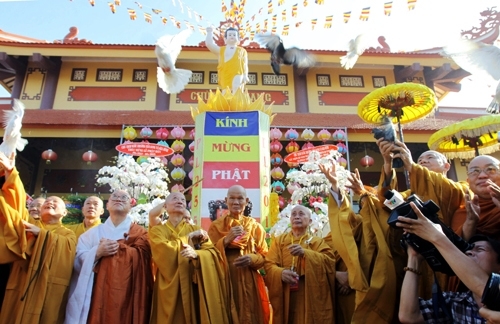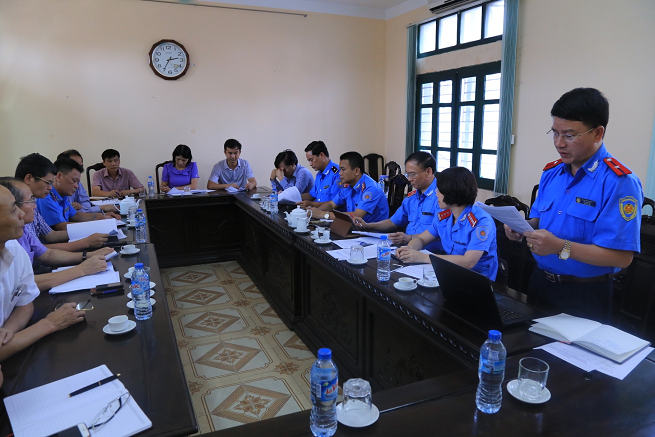November 13, 2008, at the 4th session of the XII National Assembly, the Law on Cadres and Civil Servants was passed.

Officials according to the provisions of the Law on Cadres and Officials include:
- An official is a Vietnamese citizen who is elected, ratified, or appointed to hold a position or title on a term basis in agencies of the Communist Party of Vietnam, the State, political-social organizations at the central level, in provinces, centrally-run cities (hereinafter referred to collectively as provincial level), in districts, district-level towns, provincial cities (hereinafter referred to collectively as district-level), within the staffing establishment, and receiving salaries from the state budget.
- A public servant is a Vietnamese citizen who is recruited, appointed to a rank, position, or title in agencies of the Communist Party of Vietnam, the State, political-social organizations at the central level, provincial level, district level; in institutions or units of the People's Army but not officers, professional soldiers, or defense workers; in institutions or units of the People's Public Security but not officers or non-commissioned professional officers and within the leadership and managerial apparatus of public service providers of the Communist Party of Vietnam, the State, political-social organizations (hereinafter referred to collectively as public service providers), within the staffing establishment, and receiving salaries from the state budget; for officials within the leadership and managerial apparatus of public service providers, salaries are guaranteed from the wage funds of public service providers in accordance with the law.
- Commune-level officials in communes, wards, commune-level towns (hereinafter referred to collectively as communal level) are Vietnamese citizens elected to hold positions on a term basis in the Standing Committee of the People's Council, the People's Committee, Secretary, Deputy Secretary of the Party Committee, the head of political-social organizations; commune-level public servants are Vietnamese citizens recruited to hold a professional specialization title of the communal People's Committee, within the staffing establishment, and receiving salaries from the state budget.
Officials have the following rights:
- To be granted powers commensurate with the duties.- To be ensured of equipment and other working conditions as prescribed by law.- To be provided with information relevant to assigned tasks and powers.- To be trained and fostered to improve political, professional, and operational qualifications.- To be protected by law while performing public duties.- To be guaranteed a salary by the State corresponding to the assigned duties and powers, suitable to the socio-economic conditions of the country. Officials working in mountainous, border areas, islands, remote areas, areas with ethnic minorities, areas with particularly difficult socio-economic conditions or in sectors, occupations with hazardous, dangerous environments are entitled to allowances and preferential policies as prescribed by law.- To receive overtime pay, night work pay, business trip expenses, and other policies as prescribed by law.- To have annual leave, holidays, and personal leave in accordance with labor laws. If, due to task requirements, officials do not use or do not use up the annual leave days, they are entitled to a compensation in addition to the salary for the unused leave days.- To be guaranteed the right to study, conduct scientific research, participate in economic and social activities; to enjoy housing, transportation means, social insurance benefits, health insurance policies as prescribed by law; if injured or sacrificed in the line of duty, they are entitled to policies as war invalids or considered for recognition as martyrs and other rights as prescribed by law.
Officials have the following obligations:
- To properly and fully perform and take responsibility for the results of performing the assigned duties and powers.- To have a sense of organizational discipline; strictly comply with the workplace regulations of the agency, organization, unit; report to the competent person when detecting violations of law in the agency, organization, unit; protect state secrets.- To proactively and closely coordinate in performing public duties; maintain solidarity in the agency, organization, unit.- To protect, manage, and use effectively and economically the state assets assigned.- To comply with decisions of the superior.When there is a basis to believe that a decision is illegal, promptly report in writing to the decision maker; if the decision maker still decides its execution, the implementation must have a written document and the person executing the decision must comply but is not responsible for the consequences of the execution, while reporting to the direct superior of the decision maker. The decision maker is responsible before the law for the decision.- Other obligations as prescribed by law.
In addition to fulfilling the aforementioned obligations, officials who are heads of agencies, organizations, and units must also perform the following obligations:
- Direct the organization to perform the assigned tasks and take responsibility for the performance results of the agency, organization, unit.- Check, urge, and guide the performance of public duties by officials.- Organize the implementation of measures to prevent bureaucracy, corruption, practice thrift, combat waste, and take responsibility for allowing bureaucracy, corruption, and waste to occur in the agency, organization, unit.- Organize the implementation of the law on grassroots democracy, workplace culture in the agency, organization, unit; promptly, seriously handle officials under their management who violate discipline, law, have bureaucratic attitudes, act arrogantly, abuse power, and cause trouble for citizens.- Promptly, legally solve or recommend competent agencies to solve complaints, denunciations, and recommendations of individuals and organizations.- Other obligations as prescribed by law.
Officials are not allowed to do the following things:
- Avoid responsibility, refuse assigned duties; promote factions, cause disunity; arbitrarily quit or participate in strikes.- Use state and people's assets illegally.- Exploit, abuse duties, and powers; use information related to public duties to seek personal gains.- Discriminate based on ethnicity, gender, social class, belief, religion in any form.- Reveal information related to state secrets in any form.Officials working in sectors and occupations related to state secrets, within at least 05 years from the date of decision on retirement, resignation, are not allowed to work in jobs related to the sectors and occupations they used to hold for domestic or foreign organizations, individuals, or joint ventures with foreign countries.
- Engage in activities related to production, business, personnel work as prescribed in the Law on Anti-Corruption, the Law on Thrift Practice and Waste Combat, and other activities as prescribed by law and competent agencies.
Conditions for registering for official recruitment
Persons with the following conditions, regardless of ethnicity, gender, social class, belief, religion, may register for official recruitment:
- Have a Vietnamese nationality.- Be at least 18 years of age.- Have an application form; have a clear resume.- Have appropriate diplomas and certificates.- Have good political qualities and ethics.- Be physically fit to perform the duties.- Meet other conditions as required by the recruitment position.
The following persons are not allowed to register for official recruitment:
- Not residing in Vietnam.- Incapacitated or restricted in civil act capacity.- Being prosecuted for criminal liability; serving or having served a criminal sentence but not yet having their criminal records expunged; being subjected to administrative measures of being sent to a compulsory detoxification facility, compulsory education facility.
Method of official recruitment:
Official recruitment is conducted through competitive examination. The form and content of the official recruitment examination must be appropriate to the sector, ensuring the selection of persons with qualities, qualifications, and abilities that meet the recruitment requirements.
In cases where persons who meet the conditions for official recruitment register and commit to voluntarily work for 05 years or more in mountainous, border areas, islands, remote areas, areas with ethnic minorities, and areas with particularly difficult socio-economic conditions, recruitment is through selection.
Forms of discipline for officials
Officials who violate the provisions of the Law on Cadres and Officials and other relevant legal provisions, depending on the nature and severity of the violation, will be subject to one of the following disciplinary forms:
- Reprimand;- Warning;- Salary step demotion;- Position demotion;- Dismissal;- Forced resignation.
Demotion and dismissal only apply to officials holding leadership and managerial positions.
Officials convicted by the court with a prison sentence without suspension shall be naturally forced to resign from the date the judgment or decision takes legal effect; official leaders or managers who commit crimes and are convicted by the court, and the judgment or decision has taken legal effect, shall naturally cease holding the appointed positions.
Officials are exempt from liability in the following cases:
- Compliance with illegal decisions of superiors but had reported to the decision maker before compliance;- Due to force majeure as prescribed by law.
Officials terminate in the following cases:
- Due to organizational arrangement;- Based on personal desire and approved by competent authorities;- Officials who, for two consecutive years, complete tasks but have limited capacity or have two consecutive years, in one of which they complete tasks but have limited capacity, and the other year do not complete tasks, the competent agency, organization, unit arranges other jobs.
Officials who fail to complete their tasks for two consecutive years will have their termination settled by competent agencies, organizations, units.
Source: Quang Binh Province Electronic Portal
 Article table of contents
Article table of contents
![[InfoGraphic] 6 forms of discipline for officials and public employees under Decree 71/2016/ND-CP](https://cdn.lawnet.vn//uploads/NewsThumbnail/2016/07/12/1319291-01.png)




.Medium.png)
.Medium.png)
.Medium.png)
.Medium.png)
